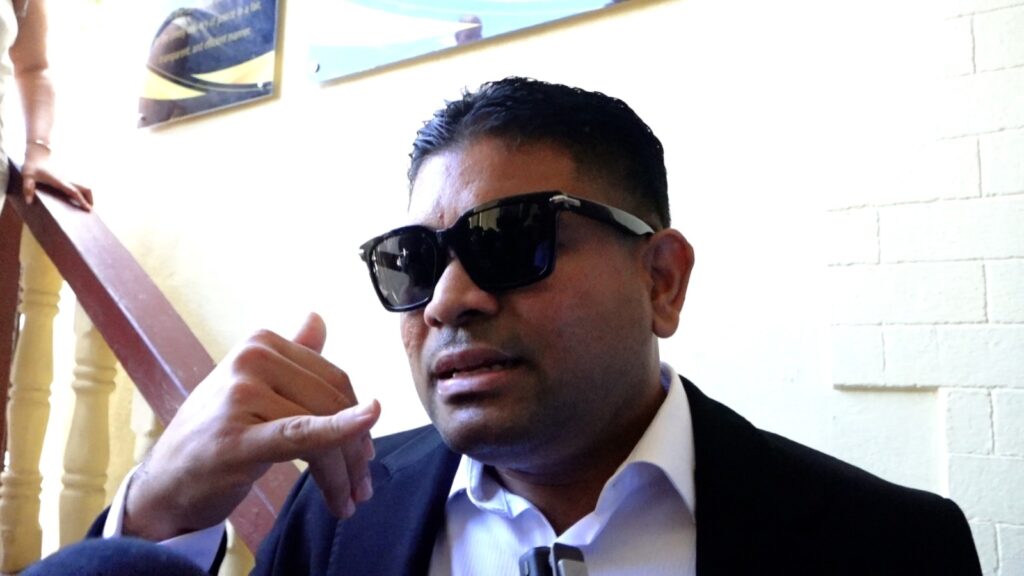
Billionaire Businessman and Presidential hopeful, Azruddin Mohamed was placed on a total of $500,000 bail by acting Chief Magistrate Faith Mc Gusty after he was charged with fraudulent declaration and tax evasion in relation to the purchase of a luxury vehicle back in 2020.
Mr. Mohamed, who remains sanctioned by the US Government over tax evasion and gold under-declaration claims, entered a not guilty plea to the criminal charges filed against him by the Guyana Revenue Authority.
With his Attorneys, Damien Da Silva and Darren Wade at this side, the businessman was granted bail in the sum of $250,000 on each of the two charges.
His Attorneys have declared that the Court has no jurisdiction to entertain the case brought by the Guyana Revenue Authority.
Attorney Darren Wade told the Court that the charges ought to have been filed within six months of the alleged offences, and the issue of limitation therefore arises – a position he maintained outside the courtroom.
“The charge states that these offenses allegedly transpired in 2020, which is way beyond the six-month period. These charges are bad in law. It is very clear that a Magistrate is a creature of statute, and these charges ought not to be instituted. They are bad in law,” Wade told reporters.
Inside the courtroom, Attorney for the Guyana Revenue Authority (GRA), Sanjeev Datadin, argued that there is no limitation that would apply if the Authority did not know that the transaction was fraudulent. The Customs Tax Act that provides for an enforcement period of seven years, he said.
Declaring that she would not comment on the matter at the time, the acting Chief Magistrate instructed both sides to make submissions on the issue raised by Wade.
Wade had pleaded with the Court to cancel the bail, but the Acting Chief Magistrate Mc Gusty said that Mohamed would not be prejudiced by paying the bail.
According to the particulars of the offences, on the 7th December 2020, Mr. Azruddin Mohamed caused a false declaration to be made to the Revenue Authority contrary to Section 217 of the Customs Act, Chapter 82:01.
It is alleged that he falsely declared in incorrect value for the luxury vehicle he imported.
Mohamed allegedly indicated that he purchased the luxury vehicle for US$75,300, instead of the market purchase price of US$695,000.
Additionally, he is accused of fraudulent evasion contrary to Customs Act.
According to the particulars of that offence, Mohamed evaded more than $383 million in taxes by making a false declaration of costs.
In defence of his client, Attorney Damien Da Silva told the Court that the charges are coming close to five years after the luxury vehicle was imported by his client. The Lamborghini car was imported in December 2020.

Da Silva said it was not until March, 2025 that Mohammed received a correspondence from the Revenue Authority with allegations of tax evasion, and insisting that the outstanding sum must be paid within 14 days or the vehicle would be seized. He argued that his client has already taken the matter before the Court.
“Again, this matter is before the High Court. Now Mr Mohamed is asking for some declarations in that matter that the actions of GRA are illegal. Now, this has led us to these proceedings. Now, today, we were able to put forward arguments to have the matters dismissed as opposed to going to trial. We feel confident in our submissions. We will put those before the court, and the court will rule on the matter,” Da Silva told reporters.
The GRA’s Attorney, Sanjeev Datadin argued inside the Court that the GRA conducted a reassessment of the luxury vehicle imported by Mohamed and found that the cost was deflated to reflect a lower value. He said it was based on the reassessment, that is provided under the law, that the Tax Authority wrote Mohamed and instructed that he respond within 14 days.
Datadin said instead of providing the GRA with the required documents to prove his case, the accused responded to the GRA’s letter seeking additional information on its claims.
“It wasn’t new taxes,” he argued, emphasizing that GRA is well within its right to do reassessments.
Further, he argued that notwithstanding the case before the High Court, the criminal Court takes precedence in any dispute or matter.
“The Privy Council and the Caribbean Court of Justice rule that criminal court are precedent in any dispute or matter, and that the criminal jurisdiction applies that whatever defenses you wish to raise, you can’t divide into other jurisdictions. It must be raised in this court,” he argued.
The case will come up again on June 26 for arguments.












You must be logged in to post a comment Login